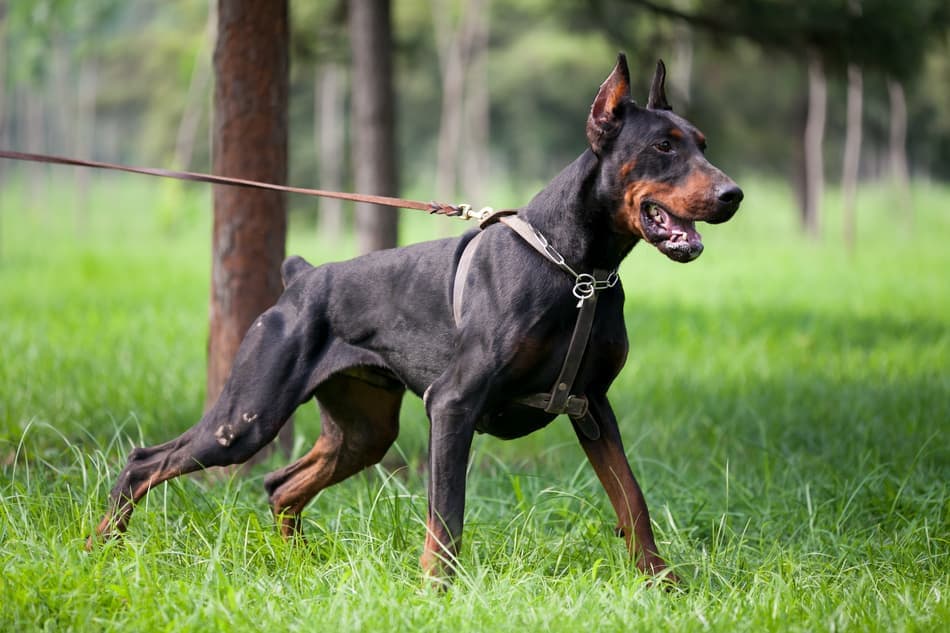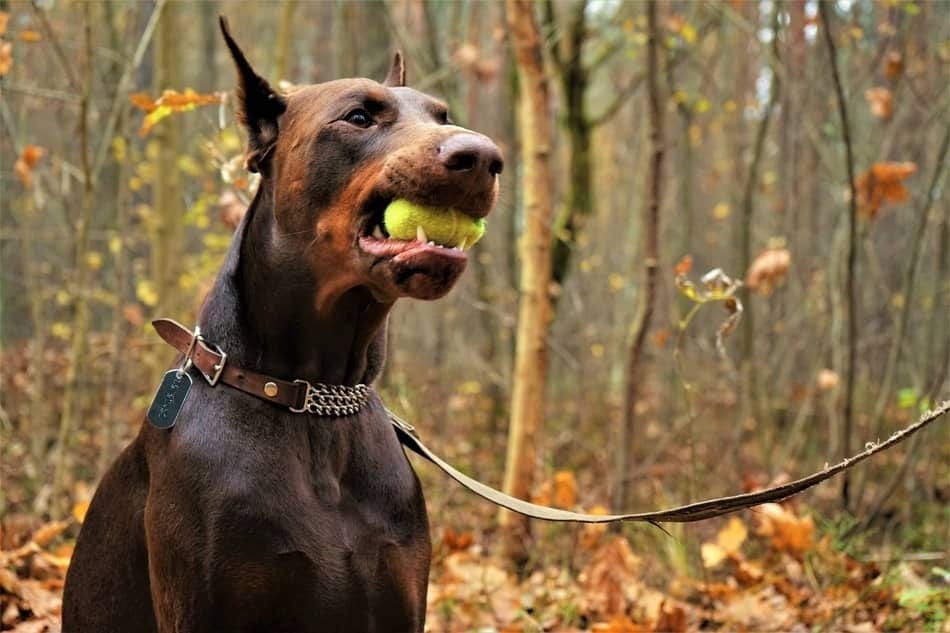When it comes to strength, the Doberman is a breed that stands out. Known for their muscular build and powerful physique, these dogs exude an aura of strength and agility. With their well-defined muscles and robust bone structure, Dobermans are a force to be reckoned with.
Originating from Germany, Dobermans were initially bred as guard dogs, which required them to have not only physical strength but also a keen sense of alertness and loyalty. This breed is known for its ability to protect its family and property, making them highly sought after in security and law enforcement roles. With their immense strength and protective instincts, it’s no wonder that Dobermans are regarded as one of the strongest breeds in the canine world.
Dobermans are known for their strength and athleticism. With a muscular build and an average weight of 60-100 pounds, they are considered one of the strongest dog breeds. Their powerful jaws can exert a bite force of around 235-600 pounds per square inch, which is impressive. Additionally, their agility and endurance allow them to excel in various dog sports and activities that require strength. Overall, Dobermans are formidable and robust dogs.

How Strong is a Doberman?
A Doberman is a powerful and athletic dog breed that is known for its strength and agility. But just how strong are they? In this article, we will explore the physical capabilities of a Doberman and discuss their strength in various aspects. From their muscular build to their endurance and bite force, we will delve into what makes a Doberman a remarkably strong dog.
Muscular Build
A Doberman has a well-defined and muscular build, which contributes to their strength. Their muscular physique is a result of their genetic makeup and the breed’s history as a working dog. The Doberman’s chest is deep and broad, providing a solid foundation for their strength. Their shoulders are well-developed, allowing them to exert power and speed. Additionally, their hindquarters are strong and sturdy, enabling them to generate force and propel themselves forward. Overall, the Doberman’s muscular build gives them the necessary strength to perform various tasks.
The strength of a Doberman’s muscles plays a crucial role in their physical abilities. They have strong and powerful legs, which allow them to run and jump with ease. Their muscular neck and jaw provide them with the strength needed for tasks such as gripping and pulling. This combination of muscle strength throughout their body gives the Doberman an impressive level of physical power.
It is important to note that while Dobermans are strong, their strength is not limitless. As with any dog breed, there are variations in individual strength and physical abilities. Factors such as genetics, exercise, and nutrition can all influence the overall strength and muscular development of a Doberman. However, as a breed known for their strength, they generally exhibit impressive physical capabilities.
Endurance and Stamina
In addition to their muscular strength, Dobermans are also known for their endurance and stamina. These dogs were originally bred to be working dogs, performing tasks that required physical exertion and stamina. As a result, they possess an innate ability to handle demanding physical activities for extended periods.
Dobermans have a high energy level and require regular exercise to maintain their physical and mental well-being. They excel in activities such as jogging, hiking, and agility training, where their endurance and stamina come into play. With consistent training and exercise, a Doberman can develop even greater endurance and stamina, allowing them to perform tasks for longer periods without becoming fatigued.
Their ability to maintain physical activity for prolonged periods is rooted in their overall fitness level and efficient circulation. Dobermans have a strong heart and lungs, which enables them to efficiently distribute oxygen throughout their body during physical exertion. This, combined with their muscular strength, allows Dobermans to maintain a high level of endurance.
Bite Force
Another aspect of a Doberman’s strength is their bite force. Dobermans are known for having a strong bite and powerful jaws. Their bite force is influenced by the size and shape of their jaw and the strength of their jaw muscles.
While there is no specific measurement of a Doberman’s bite force, it is estimated to be around 235-245 PSI (pound per square inch). This places them in the upper range of dog breeds in terms of bite force. Their powerful bite is an asset when it comes to tasks such as protection work or guarding. It is important to note that a Doberman’s bite force should never be used in an aggressive or harmful manner, but rather for their intended purposes under proper training and supervision.
The strength of a Doberman’s bite is also related to their jaw structure. Dobermans have a strong and well-aligned bite, with a scissor bite pattern where the teeth from the upper and lower jaws mesh together neatly. This bite structure enhances their biting power and grip, contributing to their overall strength.
Working Abilities
Dobermans are often used as working dogs in various roles, including search and rescue, police work, and therapy work. Their strength and physical abilities make them well-suited for these tasks. In search and rescue operations, Dobermans can navigate challenging terrain and use their strength to help locate missing individuals. In police work, their strength and bite force can be utilized for apprehending suspects or providing protection. Additionally, their strong presence and reliability make them effective therapy dogs.
Dobermans’ intelligence and trainability further enhance their working abilities. They can be trained to perform complex tasks, responding to commands and using their strength appropriately. Their ability to focus and work diligently makes them valuable assets in various working environments.
Overall Strength and Capabilities
In summary, a Doberman is a strong and athletic dog breed known for its physical power and capabilities. Their muscular build, endurance, bite force, and working abilities all contribute to their overall strength. While individual variations exist, Dobermans generally possess an impressive level of strength and are capable of performing physically demanding tasks.
It is essential to understand that a Doberman’s strength should be respected and harnessed through responsible ownership, training, and socialization. They are loyal and protective dogs that require proper care, exercise, and mental stimulation to thrive.
Are Dobermans Dangerous Dogs?
While Dobermans are strong and powerful, it is important to dispel the myth that they are inherently dangerous dogs. A dog’s behavior and temperament are primarily influenced by genetics, upbringing, and socialization. Responsible breeding, proper training, and early socialization are crucial in shaping a Doberman’s temperament and ensuring they are well-behaved and non-aggressive.
Dobermans have a reputation for being loyal, intelligent, and protective. They are typically gentle and loving with their family members, including children. However, like any dog breed, they require proper socialization and training to ensure they interact positively with other people and animals.
It is essential for potential Doberman owners to understand the commitment required to raise these dogs responsibly. Training and socialization should begin at an early age to help them become well-rounded and balanced companions. With the right care and guidance, Dobermans can be wonderful family pets that provide love, companionship, and protection.
Key Takeaways
- Dobermans are known for their strength and athleticism.
- They have powerful jaws and muscular bodies.
- Dobermans have a high energy level and require regular exercise.
- They are known for their loyalty and protectiveness towards their families.
- Proper training and socialization are important for a well-behaved Doberman.
Frequently Asked Questions
Here are some commonly asked questions about the strength of Dobermans:
1. Are Dobermans strong dogs?
Yes, Dobermans are known for their strength. They have a muscular build and powerful physique, making them one of the strongest dog breeds. Their strength comes from their breeding as working dogs, originally bred for guarding and protection tasks. Dobermans have strong jaws and their bite force is enough to cause significant damage if they feel threatened or are provoked.
In addition to physical strength, Dobermans are also mentally strong. They are intelligent and have a high level of endurance, making them capable of intense physical activities like agility training and obedience competitions.
2. How does a Doberman’s strength compare to other dog breeds?
Dobermans are considered one of the strongest dog breeds. They have a well-balanced combination of strength, speed, and agility. While there are other strong dog breeds like Rottweilers, Pit Bulls, and German Shepherds, Dobermans are known for their exceptional strength and power. Their muscular build, coupled with their strong bite force, gives them an advantage in terms of physical strength.
However, it’s important to note that strength can vary among individual dogs, regardless of the breed. Factors such as genetics, training, and overall health can influence the strength and physical capabilities of a Doberman or any other dog.
3. Can Dobermans be trained for strength tasks?
Yes, Dobermans can be trained for strength tasks. Due to their natural physical abilities and intelligence, they excel in various training disciplines, including strength-based tasks. With proper training and guidance, Dobermans can participate in activities like weight pulling and protection training. Their strong and agile bodies make them well-suited for these types of tasks.
However, it’s essential to ensure that training is conducted under the supervision of a professional trainer who specializes in strength training for dogs. This will help prevent any injuries and ensure that the training methods are safe and effective.
4. Are Dobermans naturally protective due to their strength?
While Dobermans are naturally protective dogs, their strength is not the sole reason for their protective instincts. Dobermans were originally bred for guarding and protection tasks, so it is in their nature to be protective of their families and territory. Their strength, combined with their loyalty and intelligence, makes them excellent guard dogs.
However, it is important to emphasize that a Doberman’s protective instincts can be further enhanced through proper socialization and training. Early socialization and obedience training help to channel their protective nature in a controlled and balanced way, making them reliable and well-behaved companions.
5. How can I ensure my Doberman stays strong and healthy?
To keep your Doberman strong and healthy, there are several key factors to consider:
Diet: Provide a balanced and nutritious diet that meets your Doberman’s specific dietary needs. Consult with a veterinarian to determine the best diet for your dog, considering factors such as age, activity level, and any specific health concerns.
Exercise: Regular exercise is essential to keep your Doberman physically and mentally stimulated. Engage in activities like daily walks, play sessions, and structured training exercises to maintain their strength and overall fitness.
Training and mental stimulation: Dobermans thrive on mental stimulation, so provide them with regular training sessions, interactive toys, and puzzles to keep their minds sharp and engaged. This will contribute to their overall well-being and prevent behavioral issues.
Regular check-ups: Schedule regular veterinary check-ups to monitor your Doberman’s health and catch any potential issues early on. Vaccinations, parasite prevention, and regular dental care are also important to maintain their overall health.
By prioritizing these aspects, you can ensure that your Doberman remains strong, healthy, and happy throughout their life.

THE POWER OF DOBERMAN – HE WAS CREATED FOR THIS
In summary, Dobermans are considered one of the strongest dog breeds due to their muscular build and athleticism.
They have a powerful bite force and are known for their strength, endurance, and agility.
However, it’s important to note that a dog’s strength can vary individually, and factors like training and genetics can influence their overall strength.
